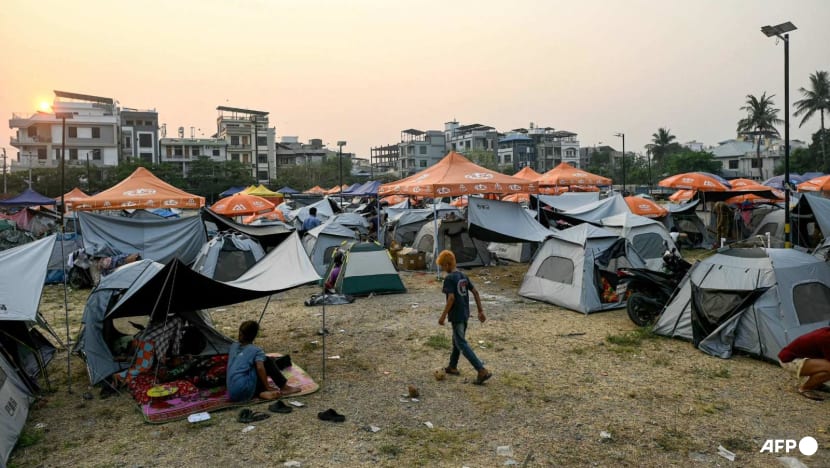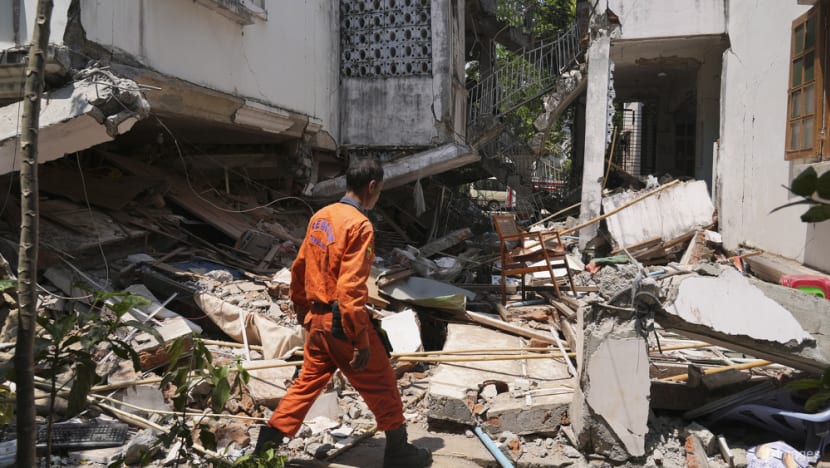‘Going to take a whole lot more’ to rebuild war-torn Myanmar after deadly quake, say aid agencies
UN Assistant Secretary-General Kanni Wignaraja said access into Myanmar, which is notoriously difficult even under normal circumstances, is critical for quake victims.

Residents take shelter in a makeshift tent camp in Mandalay on Apr 1, 2025, a few days after the deadly Myanmar earthquake. (Photo: AFP/Sai Aung Main)

This audio is generated by an AI tool.
War-ravaged Myanmar requires massive international effort to recover from last Friday’s (Mar 28) devastating earthquake that has killed at least 2,700 people, said aid agencies.
This comes as assistance is just starting to trickle into the country already facing a dire humanitarian crisis from its four-year-long civil war.
United Nations Assistant Secretary-General Kanni Wignaraja stressed that access into Myanmar is critical at the moment.
Beyond the immediate relief work, it is “going to take a whole lot more to build back a country that has been destroyed” since the 2021 military coup that ousted a democratically elected government and plunged the nation into conflict, she told CNA’s Asia Tonight on Monday.
Wignaraja, who is also regional director for Asia and the Pacific at the United Nations Development Programme (UNDP), added that agencies need to look beyond immediate aid in the aftermath of the quake, and at longer-term relief efforts for the war-torn nation.

AID AGENCIES STRUGGLING
On Friday, a powerful 7.7-magnitude quake struck near the central Myanmar city of Mandalay.
Shortly after, Myanmar’s military chief Min Aung Hlaing made a rare call for international assistance.
But observers said disaster response in hard-hit areas has been hampered by various factors. These include a lack of access to aid and proper equipment, damaged roads and communications infrastructure, and the ongoing conflict.
“The earthquake has consequences in parts of the country that are not so easy to access, where control is disputed, and those areas are going to be harder to reach,” said Alexander Matheou, the International Federation of Red Cross and Red Crescent Societies’ (IFRC) Asia Pacific director.
“The epicentre is reachable, but not all the people affected, I would imagine at this point, are seeing assistance.”
Hopes of finding more survivors under the rubble of collapsed buildings have faded, as the crucial 72-hour “golden window” has closed. After that timeframe, the chances of survival without a water source diminishes quickly.
Matheou said there will be “intense international effort in the coming week”, as agencies race to stablise communities affected by the quake ahead of the monsoon season, expected within weeks.
“We want to protect as many lives as we can,” he told CNA’s Asia First on Tuesday.
The IFRC, the world’s largest humanitarian network, has launched an emergency appeal for 100 million Swiss francs (US$113 million) to assist with life-saving relief and early recovery support over the next 24 months.
Its local Myanmar Red Cross Society has mobilised trained volunteers to administer first aid, deploy mobile health teams and distribute emergency relief items such as blankets, tarpaulins, and hygiene kits.
EXTREMELY VULNERABLE POPULATION
Four days after the quake struck, Myanmar still does not “have the full coordination mechanisms and aid flow that we would like to see”, said Matheou.
“But that's not unusual. Myanmar is not an easy place to deliver assistance. Custom clearances, visa permissions – all of these things can be quite difficult to move forward quickly.”
Aid groups highlighted several immediate needs, including clearing debris, restoring water and electricity supplies, and addressing food and health concerns.
The population is extremely vulnerable, said Matheou.
“(There is a need) to make sure that lives are protected, basic necessities like food, water, shelter, medical care, are provided in the short term.”
But even as the ruling junta seeks international help to cope with quake relief, it has continued to order airstrikes on civilian targets.
Wignaraja noted that it is critical the government halt all military action.
“It's bad enough when nature is against you,” she said. “You don't need further attacks at this time, while they're trying to put their lives back together.”
Some volunteers have also claimed that the military is blocking assistance from reaching earthquake survivors and confiscating supplies.
“Neutral and impartial humanitarian assistance should reach anybody who needs it, regardless of political affiliation or regardless of where they are located,” said Matheou.
“I hope we will not see those blockages. I hope we will be able to overcome them and (that) human solidarity will be greater than any incentives to block critical humanitarian assistance.”

















